*With the WHO admitting what everyone had already suspected – namely that there was no treatment for Ebola because it had previously only affected poor countries, as well as both the BBC’s current reporting cycle and even my own gloomy assessments I’m begininning to worry that there’s a risk that in our minds this outbreak becomes just one more distant tragedy – another stereotypical African disaster replete with heartbreaking images of bereaved parents and monochrome underfed orphan children crying up at the cameras.
The point is that all tragedies of this nature involve actual human people and the risk is that we distance ourselves from the suffering of these people in far-flung lands – that we begin to dehumanise them as their experience of life becomes more remote from our own. At this point, in some way, we feel they are not like us and what is happening to them, whilst bad, has no real connection to us once we become inured to the sad images before us, once the story ceases to be news and we move on to the next important issue of the day.
Of course, for me, this particular disaster is obviously more personal. So what I want to do today is not show you any more sad faces of people you can’t relate to. I’m going to show you some of our friends and tell you why they’re awesome.
Biden
So here’s Biden, on Bureh beach with us. Biden was pretending to be asleep so that I could show Adam how much he was relaxing whilst Adam was on holiday. Biden, possibly fuelled by Mercy’s vodka, thought this was very funny.
Biden is an excellent cook, motorcycle rider and source of ‘bush wisdom’. He adopted what he called the “English wave” early on in the outbreak to avoid shaking hands, even though he didn’t really believe Ebola was real and even if it was it was, he argued, it was just like AIDS: “First the Africans get AIDS and the white people say there’s no medicine. But then there’s medicine, but it’s expensive-o! It will be the same with Ebola. First they say no medicine, but then, maybe after one year, there will be medicine – but it will be expensive-o!” He wags his finger with a grin as he says this. Biden also tried to argue, somewhat desperately, that sexually transmitted diseases could sometimes also be caught by “working too hard”.
Adam first met Biden when he was first in Sierra Leone years ago. He hired him as his ocada driver one day and found he was that rare thing: a safe driver. Adam tried to ride with him every day, and then the one day he couldn’t find Biden he had an accident. He swore never to trust another rider again. When Adam left Sierra Leone that first time, expecting never to return, he left Biden a valuable gift: boxes of cutlery, plates and assorted housewares. Biden accepted the boxes solemnly and said “I’ll keep them until you return”. Adam told him that he wasn’t coming back, and that Biden should use the things himself. And Biden did as Biden does: nodded in assent, and then ignored the instructions and did things his own way. When Adam returned to Sierra Leone some two years later he called Biden to offer him a full time role as his ocada driver and housekeeper. When Biden turned up, he brought Adam’s boxes, completely untouched. “I knew you’d come back,” Biden said. He hadn’t even opened them.
Moses
This is Moses. I love this picture of Moses, because it’s pretty rare to see him relaxed and laughing. Since Moses’ father died during the war Moses has taken care of his mother and brother. He’s about my age, and one day, after the war, he said “Mother, I need to go back to school,” and he did, working on the streets in the morning to earn enough money to pay for school in the afternoon. He did the same thing to get through university, too, managed to get himself a partial grant and then worked in the library to pay the rest of his tuition. Now he wants a masters. Moses is the heart of the University’s registry office. He is a powerhouse – diligent and honest to a fault, and only occasionally taking catnaps in front of his computer screen. He has one single Word document that contains every piece of correspondence he has ever written and every template he might need – so each time a letter needs to be sent he will scroll through to the appropriate page, pick out the necessary changes, letter by painstaking letter, then select and print the required text.
He cuts a lonely figure on the campus, his unimpeachable honesty and scruples often making him the enemy in a society that takes corruption for granted. His honesty makes people mistrust him! He’s also a kind and thoughtful friend, and is unusually soft spoken and considered in his thinking. Georgie and I met him on the evening of his birthday, we gave him a birthday card with some money stuffed inside. Moses earns a pittance and sends most of it home to his family. The next morning, having opened the card, instead of his usual “Good morning” he shook his head and just said, “Ian.” And then he hugged me. When we left he gave us a wedding card. People don’t really give a lot of greetings cards over there, so it meant a lot. I didn’t know how to tell him in a way that wouldn’t embarrass him how much I valued his friendship and how much I would miss him. He emails me quite often, so I know he’s still battling the same problems – still working hard to be absolutely ready when the university re-opens. I asked him why he didn’t go back to Kabala to be with his family. He said there was too much work to be done, and no-one but him to do it.
Habib
There’s Moses and Biden with Habib in the background, in a baseball cap that might as well be glued to his head. I only ever saw Habib once without a cap on, and I almost didn’t recognise him. We owe our safety to Habib, who drives with his seat reclined almost horizontal, peering over the rim of the steering wheel – “One-speed Habib”, they call him at the university, because of the steady 110km/h he tends to prefer. All this, we learned in time, was a hangover from his stint driving for Unimog during the war. His stories of that time are terrifying, astonishing and brutal. Habib is absolutely a survivor. He can occasionally be pretty moody, too, but usually with good reason. But mostly, when you asked him to drive for just a little longer at the end of a hard day on bad roads he would just grin and say, “No problem.”
He never gave up trying to teach us the Temne greeting of “Sekeh, Indire, tanto Koroo” which I’m sure I’ve still got wrong, and certainly misspelled. One of my favourite memories was barrelling back towards Makeni with Georgie asleep in the back. We had been whooping at all the crazy drivers all the way home right up until, almost home, one of the brand new government coaches fully laden with freight to almost double its normal height came hurtling round the corner sideways just ahead of us, dangerously close to spilling itself all across our lane. As the bus slid sideways towards us we looked open-mouthed at each other, ready to exclaim out in shock but, as it slithered past and on its way we suddenly, simultaneously, remembered our sleeping passenger in the rear of the car and in that instant shared a silent look that crossed all bounds of understanding, clearly communicating: “She need never know this happened….”
Habib is at home wherever he finds himself, and was legendary for making friends. You’d be in the absolute middle of nowhere where he had never been before and he would wander off without warning, reappearing minutes later, carrying dry fish and bananas chatting to some guy. “Who’s this?” you’d ask. “Just my friend,” he’d say, chomping away at his haul.
Foday
Here’s Foday. Foday wants to be an engineer. He’s smart enough to make it, too, but his future’s on hold while this disease rages. To achieve his aims he’ll need to leave the country to study elsewhere – you just can’t learn the skills he needs in Sierra Leone right now. But he’s bright, and ambitious and given a chance he’ll get there. He’s also going to give me a ride in his Lamborghini, one day.
This is a video Georgie made about Foday a couple of years back. It’s pretty amazing. He tries very hard to maintain a serious face in it, but he can’t stop grinning.
And then there’s Frank. Here he is at his graduation with Patrick, Foday and Sahr looking admiringly up at him. It’s not a pose any of them could maintain for long.
Frank’s an exceptionally decent and dedicated young man. When you realise that he lives in barely more than a tin shack, his attitude towards life seems all the more exceptional. He’s shrewd, smart and funny. We want him to take over running Ngbotima. He wants to be president. Firstly, though, he’s hoping to study law as soon as the University of Makeni re-opens. That’s a day that can’t come soon enough, for any number of reasons.
And this is Patrick posing at the beach. We took a long time getting this picture so he was happy with his pose. He later won the dance competition with some seriously committed moves, and some seriously intense harmonies in the musical routine.
Here’s the whole Ngbotima crew in the song and dance routine laid on for our entertainment. They insisted that we reciprocated with a dance of our own so, in desperation, Georgie, Jess, Johnny, Mercy and I threw out a couple of cycles of the Macarena, much to our embarrassment and the group’s general hilarity.
All of these kids from Ngbotima have already overcome the most unbelievable obstacles in their lives, and every day is still a struggle – even before Ebola struck. Now there’s no school and no work – and do they grumble? Not a word – all of their texts are full of love and good cheer and hopes that they will see us soon.
These are not sad faced stereotypes, these are our friends – and they are your neighbours.
Let’s not forget that the fight against Ebola is far from done – and people just like us, except for virtue of their country of birth – still badly need our help.
I’m incredibly proud to say that many of our friends, family and acquaintances reading this blog have already reached out to help. After I wrote about the fundraising effort for the University of Makeni, many many of you responded to donate. I can’t tell you what an amazing thing you did. Between us we made a massive contribution that means the appeal has already met its $10,000 target. The appeal is still running – and I’m afraid they still need help. Makeni remains isolated and poorly served by treatment centres. Rates of infection are still rising rapidly. The University itself is running out of money and has had to lay off many of its staff. It’s too early to know what will become of Unimak, but Adam, Dr. Sue, Father Joe and Father Ben are still doing all they can to serve their community and I still believe there’s no better way to directly help than by sending money their way. Those are four people I’d want on my side in this battle.
Of course you can also send money towards The Disasters Emergency Committee, an umbrella organisation comprising many of those charities supporting the Ebola response.
You can also donate to Georgie’s employers, the International Medical Corps, who – I can say for sure – are working insanely hard right now to set up treatment centres in Port Loko and Makeni where Georgie will be providing psycho-social first aid to survivors, the bereaved and all of the support staff risking their lives in difficult conditions.
And you can read about Georgie’s charity, The Ngbotima Charity Trust – although we’re hoping to bring you a more up-to-date website soon.
Also – how often do you get to say “Hooray for Facebook!”? We should savour that.
And finally, I should thank all of you who continue to read this. Your support has meant a huge amount to Georgie and I over the last year, and it means more than ever right now. We both get a real boost from seeing your comments and ‘likes’ – and the response to our request for help really was nothing short of incredible. I was blown away by your generosity. We are touched, and thankful to you all.
*In an earlier version of this post, I linked to a story stating that Fox news had now ended their coverage of Ebola – which, whilst appearing pretty cold, would tally with the US ending its 21 day cycle since the last Ebola case. Happily, that turns out to be not true, so there is hope for the world after all….
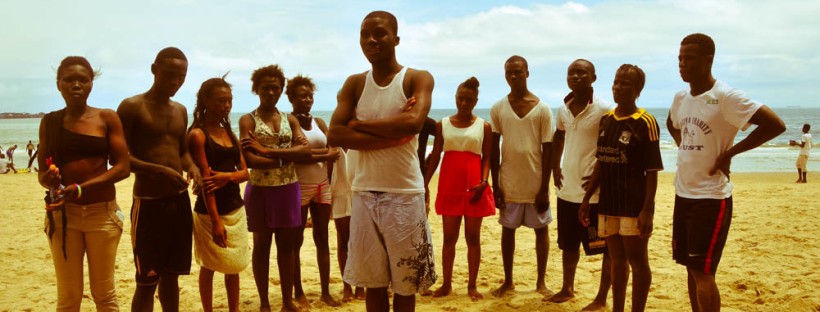
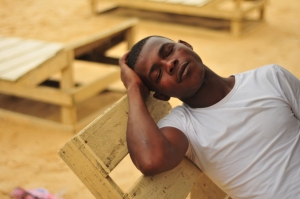
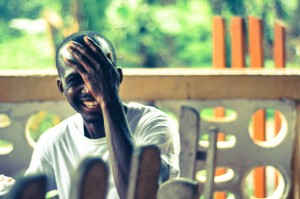
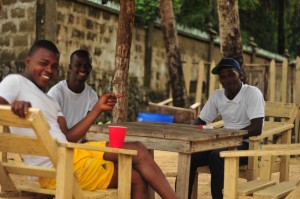
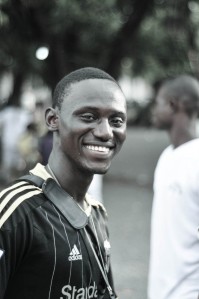
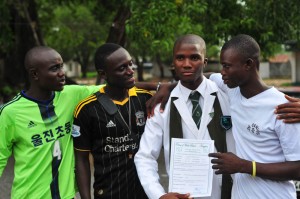
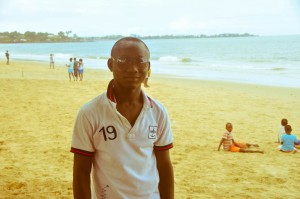
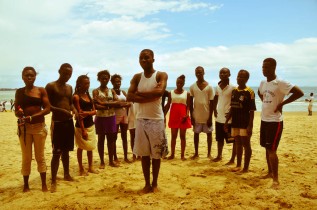
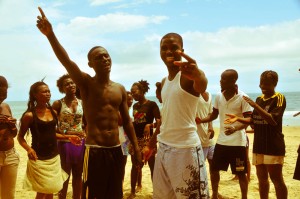
So lovely to read about the Ngbotima gang. They are an inspiring bunch indeed. Hope Georgie is getting on okay out there. Hugs from us all. Xx
LikeLike
Thanks Nina – she’s definitely keeping busy! Patrick phoned me at the weekend and told me, “Don’t worry, Ebola is not for us, not for any of the Ngbotima kids!”
LikeLike
That was a good read. More should be heard from those who are just trying to survivie in the crisis, when everyday life – as they knew it – has just broken down. The Ngbotima gang are the ones to start to re-build it. Stay strong and well to all of them.
LikeLike
Thanks Sarah – I will pass on your best. Good news from Fengai that he begins training with a British organisation today. Patrick and Foday are currently on the hunt for jobs.
LikeLike
Well done you two.
Brian and Alison
LikeLike
Great to have news of the ‘kids’ – so grown up since I met them! Hope we see you in London soon……..
love janie
LikeLike